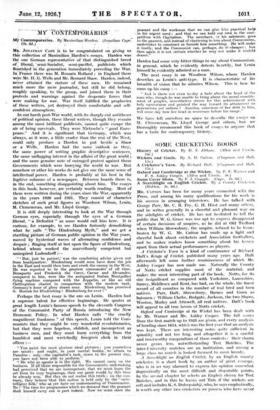MY ZION TRAIPORARIIS
My Contemporaries. . By Maximilian-Harderi." (Jonathan Cape:
12s. 6d.) - • . .
Ma. JONATHAN CAPE is to be congratulated on giving us this collection of Maximilian -Hardens. essays. Harden was the one German representative of that distinguished breed of: liberal, ssenii-Socialist, semi-Pacifist, publicists which flourished* inT the generation iminediately preceding the War. In France there was M. Romain Rolland ; in England there were Mr. H. G.-Wells.and Mr. Bernard Shaw. Harden, indeed, never attained the stature of these men. He remained much more the mere . journalist, but still he did, belong, roughly speaking, to the group, and joined them in their protests and warnings against the desperate forces that were making for war. War itself .fulfilled_ the prophecies of these writers, yet destroyed their comfortable and self- confident atmosphere. — * In our harsh post-War world, with its sharply-eut antitheses of political opinion, these liberal writers, though -limy remain among the most brilliant publicists, cannot quite escape the air of being survivals. They were Nietzsche's "goOd Euro- peans." And it is significant that Germany, which- was always, as it were, a little cruder than the rest of the -.West, could only produce a Harden to put beside' a Shaw or a Wells. Harden had the .samc -outlook • asthey,. the same power of writing graphie descriptive sentences*, the same unflagging interest in the affairi.Of the great Werld ; and the same genuine note of Outraged tautest 'against those Governments which were hurrying_ the -w`orid to war. But somehow or other his works do not give one the Smile-sense of intellectual power. Harden is proliably. at his *best in the fugitive columns of a newspaper. Between boards there is, in the end, something disappointing about him. The essays in this book, however, are certainly worth reading. Most of them were written during the years since the War, apparently in the years 1920 and 1921. They consist - of character sketches of such great figures as Woodrow Wilson, Lenin, M. Clemenceau, and Mr. Lloyd George.
It is still deeply interesting to look at the War through German eyes, especially through the eyes of a German liberal, "a Defeatist" as some would call him here. It is curious, for example, to see Harden furiously demolishing what he calla ". The Hindenburg Myth," and we " get a startling picture Of German public opinion in ihe War years, moved by hysterical waves of alternating confidence and despair ; flinging itself at last upon the figure of Hindenburg, behind whom worked the marvellously competent but uninspired Ludendorff - "'But, just be patient,' was the comforting advice given out from headquarter.. Hindenburg would soon have done the job in the East and would then turn and crush the enemy in the West. He was reported to be the greatest commander of all time. Bonaparte and Frederick the Great,. Caesar and Alexander, compared to him, were like the antiquated Italian Tfontgolfier eying machine compared with the Zeppelin, or like an old Carthaginian chariot in comparison with the modern tank. Germany's hour of glory draws near. Hindenburg has promised it. Hurrah for Hindenburg! Hindenburg for ever !"
Perhaps the best essay is the one on Lenin. Harden had a supreme talent for effective beginnings. He quotes at great length Lenin's famous speech to the eleventh Congress of the Communist Party of Russia introducing the New Economic Policy. In what Harden calls "the cruelly magnificent frankness" of this speech, Lenin told the Com- munists that -they might be very -wonderful revolutionaries, but that they were hopeless, childish, and ineompetent as business men, and they must learn everything from the humblest and most wretchedly boingeois clerk in - their offices :— ". You paint the most -glorious hleal. pictures ; you yourselves are- saints : and ought,_ in-. your -mortal- bodief,f.to . attain to
Paradise : task, down td: the present day, you have -not. been able to ,perform.", - • • . .. •
He whdlio speaks the We Cannoi. carry on the business. If airthciae reSponsible for_the Communistic undertaking had perceived that We are incompetent, that We" rniist.. learn the art from its very beginnings, then our gin* would by this time be already won: But they do not realise this truth ; on the con- trary, they believe 'that this notion is held only by the r' unin- telligent folk,' Whe'fis -yet haireitntindaratanding Of CoMinunism. ! The time for progranunea -which we:demand that the -peasant shall himself carry out is past indeed:. Now we- mnst. she* the peasant and the workman that we can give him practical help • an his urgent need: and that we can hold our own in the corn- petitton with Capitalism. The merchant, er his salesman, goes to the peasant, and instead of chattering to him about Commmusm, undertakes to construct or furnish him something. -Be will Make it-costly, and the Communist can, perhaps, do it-cheaper : lnt then again it 'is-notCertain whether he may not make it tenfold dearer. '
Harden had sonic very bitter things to say about Communism, in general, which he evidently detests heartily, but Lenin himself he evidently admired as a man. The next essay is on Woodrow Wilson,. whom :Harden describes as Lenin's anti-type. It is characteristic of pis breadth of vision that he admires Wilson. This is how he sums up his essay :—
"And is there not even to-day a halo about the head of the man who, though he was unable to bring about the moral ennoble- ment of peoples, nevertheless strove for this achievement with holy earnestness and pointed the way toward its attainment to generations yet unborn ? America, conscious of her debt to him, will some day bow her head in reverence before his image."
We have left ourselves no space to describe the essays on M. Clemenceau, Mr. Lloyd George and others, hut we thoroughly recommend this book of essays to anyone that has a taste for contemporary history.






















































 Previous page
Previous page